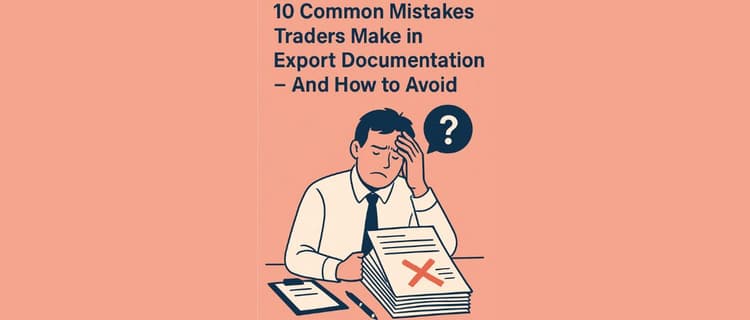International trade thrives on export documentation. Even the most lucrative transactions can become a loss as a result of the slightest documentation slip-up. Whether they arrive late or result in fines and penalties, errors are costly. Be it a buccaneer or a longtime exporter, here are some common trappings of export paperwork and export documentation that could cost you time, money, and even your reputation.
These are 10 mistakes that 100% of exporters make in documentation and how to prevent them:
1. Partial or False Commercial Invoice
The European, which is a mistake: Most exporters provide commercial invoices that lack information such as accurate HS codes, product descriptions, or the declaration of value.
Avoid: use a standard invoice template and proofread everything several times. Be accurate in amount, price, and currency. The recognised invoice builds trust and speeds up customs clearance.
2. Wrong HS Codes
The error: Imposition of the wrong classes of products with the incorrect Harmonised System (HS) code implies duty misstatement or rejection at customs.
Dodge it: Ask a licensed customs broker or go straight to the government HS lookups. The right code translates to the right tariffs and hassle-free clearance.
3. Lost Certificates or Permits
The pitfall: One of the products has to be accompanied by certain documents, including Certificates of Origin, phytosanitary certificates, and even export licenses. Failure to deliver them may result in delays or cancellations.
Avoid: Make sure to work closely with the local export authority or a logistics company.
4. Document mismatch
The error: There is no consistency of information in documents, such as the invoice, packing list, and bill of lading, which raises confusion or fails to comply.
5. Wrong Consignee/Buyer Information
The error: Misroutes or even customs hold-ups may occur because of an error in the name, address, or tax number of the buyer or consignee.
Avoid it: Never draw up documentation until the buyer is confirmed. A small typing error may cause a delay of several weeks.
6. Misunderstanding of Law by Country
The trap: The needs that are unique to a country of destination are not always identified by the exporters, and this could also come in the form of labelling, where the labelling that applies to an item must be in a certain language spoken in the country, or some items cannot be exported.
It is prudent to avoid being ignorant in terms of upholding the trade regulations in any country you export. Visit the embassy or trade chambers, or simply go on the internet, where you will find information.
7. The Packing List was not done to the standard
The error: Details on the packing list may not contain item-level details, dimensions, and weight information, which may stall the movement and clearance by customs.
Avoid it: Ensure you have a comprehensive list of what you are shipping and compare it with the invoice as well as the actual package. Incorporate net/gross weight, measurements, and packages.
8. Not Mentioning Incoterms
The error: Unclear or absent Incoterms (such as FOB, CIF, or EXW) may leave uncertainty between buyer and seller regarding assumptions of duties and expenses.
Avoid: Include the correct Incoterm and location (e.g., in your invoice and contract—FOB Mumbai Port). This minimises differences and puts both parties on the same wavelength.
9. Document Delays
The mistake: The shipping bills, certificates, or invoices not reaching the right locations at the right time means that shipments can be halted and payments delayed.
Don't do it: Develop a checklist and schedule of documentation. Follow up using electronic tools to follow up and automate due dates.
10. Failure to Make Copies and Backups
The pitfall: Not keeping tax records or other documents posted in their original form or in backup copies falls into the pit of trouble, hence, financial and legal woes.
Avoid it: Scan every document you have, as well as store it in a secure place. Store in the cloud and have a paper and electronic copy.
The export paperwork might appear as a chore; nevertheless, it is an essential element of international business. Avoiding the following well-known pitfalls will help a trader to minimise the risk, enhance compliance, and establish better ties with foreign partners. Come up to scratch with the process, work with export professionals, or if you do not understand the process, work with freight forwarders. In export, the detailed focus is not only a good practice, but it is also a competitive edge.
For more detailed insights and opportunities in the industry, visit pipex.ai. Discover verified suppliers, buyers, and the latest market trends all in one place.
For updates and additional information, follow on social media platforms.
Social Media: LinkedIn, Instagram, Facebook, Pinterest.
